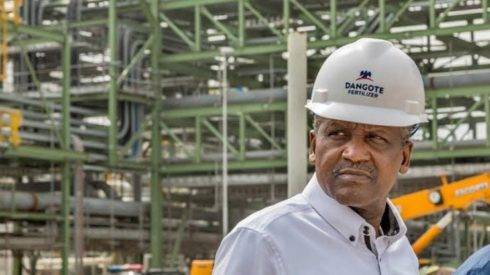The Dangote Refinery is currently facing challenges in fulfilling its obligation to supply 1.065 billion liters of petroleum products to the Nigerian National Petroleum Company Limited (NNPCL). According to official documents, only 317 million liters have been delivered as of mid-October, representing a mere 30% of the total requested supply. This significant shortfall has raised concerns about the refinery’s production capacity and its ability to meet the country’s urgent fuel demands.
NNPCL initially requested the supply to be completed within the period between September 15 and October 20. However, Dangote Refinery’s slower-than-expected output has created a growing supply gap, which may exacerbate Nigeria’s ongoing fuel challenges. With just days left before the deadline, the refinery’s underperformance is prompting questions about its ability to play a crucial role in stabilizing Nigeria’s energy sector.
September Output Below Expectations
According to NNPCL’s “Summary of Volume Loading” report, the Dangote Refinery delivered just 103 million liters of the requested volume in September, accounting for only 26% of the overall target. This shortfall in supply has heightened concerns over whether the refinery is able to meet the operational scale required to fulfill its obligations.
Dangote Refinery’s inability to produce the full volume required has exacerbated Nigeria’s already critical fuel supply issues. With energy demands on the rise, the shortfall has placed additional pressure on the NNPCL to either extend deadlines or seek alternative fuel sources to mitigate potential shortages.
Dangote Refinery: Partial Progress in October
In October, the Dangote Refinery made some headway by delivering 214 million liters, or 32% of the requested supply. While this is an improvement over September’s performance, it still leaves a significant portion of the original 1.065 billion liters undelivered, signaling ongoing challenges.
As the October 20 deadline looms, industry insiders are skeptical that the refinery will be able to meet the remaining demand. The risk of continued fuel shortages grows as the refinery struggles to close the supply gap, a situation that could destabilize Nigeria’s fuel market and lead to price volatility.
NNPCL’s Concerns Over Supply Deficit
NNPCL officials have expressed serious concern over the Dangote Refinery’s failure to meet its supply commitments. Dangote Refinery’s inability to keep pace with demand has triggered discussions around sourcing alternative suppliers or increasing imports to make up for the deficit.
Without a significant increase in production, Nigeria could face renewed fuel shortages, leading to price hikes and potential disruptions in the transportation and energy sectors. These economic ripple effects could worsen the country’s already challenging inflationary pressures.
Potential Operational Challenges at Dangote Refinery
The reasons behind the Dangote Refinery’s underperformance remain largely speculative. Industry analysts suggest the delays may stem from technical bottlenecks or logistical hurdles that are typical in the early stages of large-scale refinery operations. The lack of clarity has fueled concerns about the refinery’s long-term reliability.
Solving these operational challenges is critical if Dangote Refinery is to play a key role in Nigeria’s energy future. Prolonged delays may tarnish the refinery’s reputation, forcing the government and private sector to reconsider the refinery’s strategic role in Nigeria’s petroleum sector.
Implications for Nigeria’s Energy Security
As Africa’s largest refinery, the Dangote Refinery was intended to reduce Nigeria’s dependence on imported fuel and enhance the nation’s energy security. However, its current struggles raise questions about its immediate impact on the country’s petroleum supply chain.
Should the refinery continue to underperform, Nigeria may be forced to rely on costly fuel imports, undermining efforts to achieve energy self-sufficiency. The situation highlights the critical need for the Dangote Refinery to address its operational issues and align with the nation’s broader energy goals.
Table of Contents
Discover more from OGM News NG
Subscribe to get the latest posts sent to your email.














